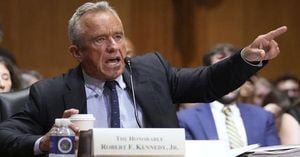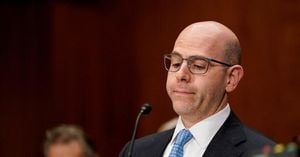Before dawn breaks in the Rio Grande Valley, patients once lined up outside Operation Border Health, an annual five-day clinic that for decades served as a lifeline for thousands in South Texas. This year, though, the doors never opened. The event, a staple for uninsured and underinsured residents in the predominantly Latino region, was abruptly canceled just before its July 21, 2025 start. The reason? A sweeping federal decision to strip more than $550 million in public health and pandemic funds from Texas, part of a much larger wave of cuts triggered by the Trump administration’s recently passed “One Big Beautiful Bill Act.”
“Some people come every year and rely on it,” Hidalgo County Health and Human Services Director Dairen Sarmiento Rangel told KFF Health News. “Some people even camp out outside of Border Health so they can be the first in line to receive services. This event is very important to our community.”
The cancellation is just one visible sign of the seismic changes rippling through health and social services across the United States in 2025. The One Big Beautiful Bill Act, a tax and spending law passed by congressional Republicans in July without any Democratic support, has set in motion a series of federal funding reductions that states are only beginning to reckon with. According to a July analysis by KFF, Texas alone expects its federal Medicaid funds to shrink by as much as $39 billion over the next decade, mostly due to new enrollment barriers such as more frequent eligibility checks.
The law’s reach extends far beyond Texas. In total, the Congressional Budget Office estimates the Act will slash federal Medicaid spending by about $1 trillion over the next ten years. The reductions are centered on imposing work requirements for Medicaid recipients who gained coverage through the Affordable Care Act’s expansion, along with other new hurdles to coverage. The CBO projects that more than 7.5 million people will lose Medicaid and become uninsured as a result. At the same time, the law extends tax cuts for the wealthy—a point of fierce contention among Democrats, who argue the cuts come at the expense of the nation’s most vulnerable.
Republicans and Trump administration officials have defended the cuts as necessary to prevent fraud and waste, and to ensure the long-term sustainability of Medicaid. “The One Big Beautiful Bill removes illegal aliens, enforces work requirements, and protects Medicaid for the truly vulnerable,” the White House said in a statement on June 29, 2025.
But the immediate consequences are already being felt in communities nationwide. In Hawaii, lawmakers are scrambling to cushion the blow for nonprofits hit by federal cuts, allocating $50 million in grants to health and social service organizations that can demonstrate a loss of federal funding. “It is not fair that organizations dedicated to supporting the people of Hawaii are being forced to scale back due to federal funding cuts,” Democratic Governor Josh Green said in a statement.
Delaware, too, is feeling the pinch. After the state received notice in March that $38 million in public health funding would be cut, legislative leaders halted a planned project to upgrade and expand the Capitol complex. “We recognized that the reckless federal cuts to the social safety nets of thousands of Delawareans called for us to hold back resources to protect our most vulnerable,” said David Sokola, president pro tempore of the Delaware Senate.
In New Mexico—the state with the highest percentage of Medicaid enrollees—a bipartisan group of lawmakers created a trust fund to shore up the program’s finances, bracing for the possibility that about 10% of the state’s 800,000 Medicaid and Children’s Health Insurance Program recipients could lose coverage. Meanwhile, in New York, Governor Kathy Hochul did not mince words at an August 18 event in the South Bronx. “What Republicans in Washington have done through the ‘Big Ugliest Bill’ I’ve ever seen is literally screwing New Yorkers,” she declared, warning that the state’s health system faces nearly $13 billion in annual cuts.
California legislators echoed those concerns at an August 20 general assembly committee hearing, with Democratic lawmaker Gregg Hart calling the law “a direct assault on California’s core programs and our values.” He added, “Sadly, the reality is, the state does not have the capacity to backfill all of these draconian federal funding cuts in the current budget. We cannot simply write a check and make this go away.”
The Act’s effects are not limited to Medicaid. The Trump administration has clawed back $11 billion in federal pandemic funds earmarked for states, igniting lawsuits from Democratic-led states. About $1 billion in federal grants for mental health services in schools have been cut, and grants from the National Institutes of Health to more than 90 public universities have been halted. According to KFF Health News, the cuts have spared no region or political leaning—about 40% of affected organizations in the first month were in states that voted for President Trump.
State leaders say the pandemic funding being reclaimed was already allocated for vital public health measures, including disease tracking and outbreak response. In May, state attorneys general secured a temporary restraining order against the administration, but the legal battles are far from over.
“What we’re seeing now is states anticipating big cuts in Medicaid coming, but they’re also dealing with a whole variety of federal cutbacks in public health programs that are smaller but still quite meaningful,” said Larry Levitt, executive vice president for health policy at KFF. Kathryn Costanza, a Medicaid expert at the National Conference of State Legislatures, described the atmosphere as one of “concern, confusion, and uncertainty.”
States are responding in varied ways. Colorado passed a bill allowing state Medicaid dollars to fund non-abortion care at Planned Parenthood clinics after the federal law banned such funding. Louisiana’s Legislature sent $7.5 million to state universities to offset research funding cuts, much of it health-related. In South Dakota, the state’s largest food bank has asked lawmakers for $3 million to make up for reductions in U.S. Department of Agriculture support.
Idaho, meanwhile, is grappling with another set of challenges. As KTVB reported, the Big, Beautiful Bill will soon strip refugees and asylum seekers of access to several federal aid programs. While the Idaho Department of Health and Welfare is awaiting federal guidance before changing the Supplemental Nutrition Assistance Program (SNAP), the timeline for other cuts is clear. Starting in October 2026, refugees will be barred from enrolling in Medicaid and the Children’s Health Insurance Program, and by October 2027, they’ll lose access to health care through the Affordable Care Act and Medicare.
“As you can imagine, the nature of them having to flee danger, they didn’t have wealth resources built up to bring with them to start their new life,” said Holly Beech with the Idaho Office for Refugees. “And so, these programs are really more of that initial early support for people when they are brand new in a country.” About 500 refugees, mostly from the Democratic Republic of Congo and Afghanistan, have resettled in Idaho over the last year. Delays in green card processing—exacerbated by a spring 2025 pause in applications—mean many will wait longer before becoming eligible for benefits again.
Senator Mike Crapo of Idaho has expressed some openness to revisiting the provisions for law-abiding refugees but emphasized that any changes would require input from colleagues and the White House.
As states form advisory groups, launch lawsuits, and reallocate scarce resources, the reality is inescapable: the U.S. is entering a new era of health and social policy, one marked by tough tradeoffs and uncertainty for millions. The hardest choices, many warn, are yet to come.




